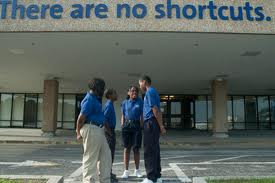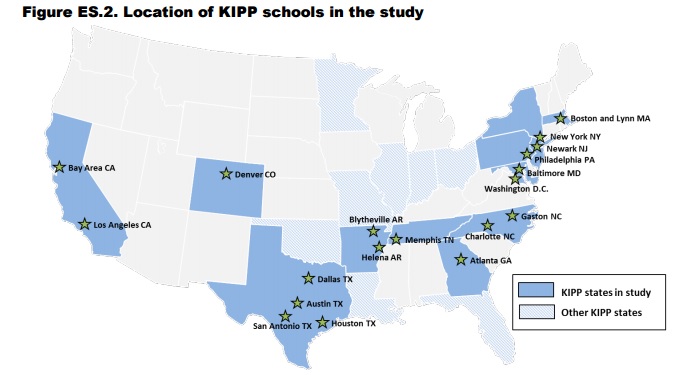 KIPP’s growing network of charter schools has helped lift student achievement, a new 8-year study shows.
KIPP’s growing network of charter schools has helped lift student achievement, a new 8-year study shows.
The charter school chain received a $50 million federal scale-up grant to speed its growth, leading to a proliferation of new schools beginning in the fall of 2011. The study results, released this morning by Mathematica Policy Research, suggest the expansion paid off and does not appear to have diluted the schools’ effectiveness.
“Network-wide, KIPP schools have positive, statistically significant, and educationally meaningful impacts on student achievement, particularly at the elementary and middle school grades,” the study says, and new schools opened during the expansion “are producing positive impacts that are generally similar to those produced by older KIPP middle schools when they were in their first years of operation.”
The Houston Chronicle sums up the effects:
On average, KIPP students moved from the 40th percentile to the 50th in math over two years of middle school and from the 37th to the 44th percentile in reading over the same period. A typical student new to a KIPP high school moved from the 48th percentile to the 59th percentile in math, and from 47th to 54th in language arts.
KIPP middle schools seemed to have a smaller impact in their first year of operation. That squares with the network’s experience in Florida. KIPP Impact Middle School, which was not included in the study, opened in Jacksonville in the fall of 2010 (a year before the scale-up period referenced in the study), and received an “F” from the state in its first year. Since then, however, the school’s performance has improved.
To make fair comparisons between KIPP and non-KIPP students, researchers matched students with similar peers, in some cases comparing students who won lotteries for slots in the schools with those who did not.
The findings align with previous Mathematica research, which has shown KIPP schools get positive results for disadvantaged students that can’t be explained away by factors like student attrition.
The researchers also surveyed students on factors like motivation and engagement. They found that, in general, there wasn’t much difference on those measures between KIPP students and their peers.
That said, KIPP parents tended to be more satisfied with their schools. At the middle school level, they were twice as likely as non-KIPP parents to rate their schools “excellent.”



